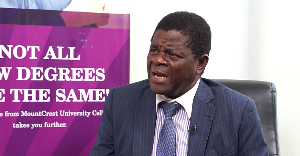The first Business Leaders Confidence Index (BLCI), which was carried out in the last quarter of 2005 by Steadman Group, has revealed that business confidence in Ghana is high, at 66-index point.
Under the sectorial indices, the financial sector was the leader in confidence with 71 index points while the Telecommunication and Information Communication Technologies (ICT) was the least, with 60 index points.
An average index reading of 50 points reflects average confidence.
In the financial sector, 73% of its business executives indicated that the current economic conditions were better than they were six months ago. "This sector had equally high expectations for the country's economy in the next six months," the report indicated.
The survey also concluded that 87% of business leaders feel that the economy will be better in the next 6 months.
However, the Telecommunication and ICT sector was the most pessimistic, with 60 index points. According to the report presented by the Country Director of Steadman Group in charge of Market Research, Media Monitoring and Management Training, Mr. Martyn Mensah, only 25% of its business leaders indicated that the current economic conditions were better, compared to 6 months ago.
Although the sector recorded a low business confidence compared with the rest, very high expectations for the economy was predicted for the coming 6 months. 75% of business leaders in the telecom and the ICT sector expect the economy to improve.
On profit expectations, the survey disclosed that 82% of business executives in Ghana expect profits to increase, although there were moderate sectorial variations.
In the financial sector, all of its business executives held the view that profits are set to grow in the coming six months.
On the question of 'where the profit WILL come from', 49% of the business executives said it would come from market demand and growth. Cost reduction was cited by 20% of the executives while new technology and price increases were mentioned by 11% and 5% of the executives respectively as main profit services.
The survey, which did comparative analysis of economic confidence in four other African countries -Tanzania, Kenya, Zambia and Uganda-, further revealed that business confidence was very high in Ghana and Tanzania, recording 66 index point each, while Kenya and Zambia recorded 62 and 58 index points respectively.
Kenyan business executives are most positive about their economy's current conditions, compared to their counter parts in the other surveyed countries.
60% of Kenya's business executives felt that the current economic conditions are better than six months ago, compared with the rest. Uganda had 28% under this category.
"Ghanaian business executives are the most optimistic about their economy six months ahead, while Ugandans are most pessimistic. Ghana and Tanzania recorded 74 and 71% respectively.
Profit expectations six months ahead is high in Ghana, Kenya and Tanzania, with their respective business leaders saying that they expected some increase in profits. "Market/demand growth is the key profit driver in all the countries".
In carrying out the survey, a total of 420 business leaders of large and medium sized companies were interviewed in 5 African countries. 121 business leaders were interviewed in Kenya, 61 in Uganda, 99 in Ghana, 55 in Tanzania and 84 in Zambia. The data was collected through telephonic, self-completion and face-to-face interviews.
In government's response to the survey results, the deputy Minister of Finance and Economic Planning, Prof. Baffuor Djan, in a speech read on his behalf by Mr. Robert Poku Kyei, stated that the results emanated from the prudent management of the economy, balancing growth with inflationary pressures. "It is the fruit of the fiscal and monetary discipline that this government has pursued since it assumed office," he disclosed.
He said while it provides encouragement for players in the economy, it also presents new challenges, especially to exceed the results.
Mr. Prince Kofi Amoabeng, the Chief Executive Officer (CEO) of Unique Trust Financial Services, on why business confidence is high in Ghana, said the simple reasons are the decreasing rates of interest, inflation and prime rates, and stable exchange rate. "Business confidence is high because the cost of borrowing is coming down," he reiterated.
He said for the country to be on the path of growth, the government must resolve the root-cause of minimizing poverty.
In his remarks, Dr. Robert Darko Osei of ISSER, University of Ghana, said the result of the survey conforms to the current realities of the economy.
The Steadman Group is an integrated market information company that offers media monitoring, market research and management training services. It currently has five offices in Ghana, Uganda, Tanzania, Zambia and Kenya.
Business News of Saturday, 11 February 2006
Source: Ghanaian Chronicle
















